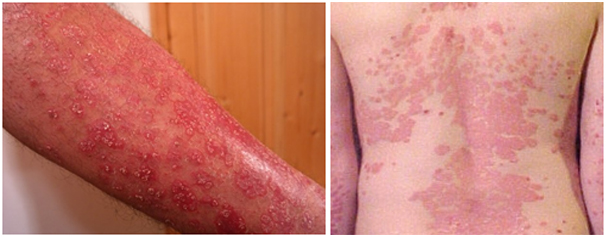Bolgs Detail

Psoriasis
Psoriasis is a chronic skin condition caused by an overactive immune system. In Psoriasis skin cells multiply up to 10 times faster than normal. Symptoms include flaking, inflammation, and thick, white, silvery, or red patches of skin.Patches of Psoriasis mainly appear on the scalp, elbows, knees, and lower back.Psoriasis varies in severity from small, localized patches to complete body coverage. People with psoriasis are at a greater risk of suffering from joint damage, eye conditions such as conjunctivitis, blepharitis and uveitis, cardiovascular disorders and kidney disorders.
Signs & Symptoms- Red patches of skin covered with thick, silvery scales, Small scaling spots (commonly seen in children), Dry, cracked skin that may bleed, Itching, burning or soreness, Thickened, pitted or ridged nails, Swollen and stiff joints
Psoriasis patches can range from a few spots of dandruff-like scaling to major eruptions that cover large areas. Most types of psoriasis go through cycles, flaring for a few weeks or months, then subsiding for a time or even going into complete remission.
There are several types of psoriasis. These include:
Plaque psoriasis. The most common form, plaque psoriasis causes dry, raised, red skin lesions (plaques) covered with silvery scales.
Nail psoriasis. Psoriasis can affect fingernails and toenails, causing pitting, abnormal nail growth and discoloration.
Guttate psoriasis. This type primarily affects young adults and children. It's usually triggered by a bacterial infection such as streptococcal throat infection. It's marked by small, water-drop-shaped, scaling lesions on your trunk, arms, legs and scalp.
Inverse psoriasis. This mainly affects the skin in the armpits, in the groin, under the breasts and around the genitals. Inverse psoriasis causes smooth patches of red, inflamed skin that worsen with friction and sweating.
Pustular psoriasis. This uncommon form of psoriasis can occur in widespread patches (generalized pustular psoriasis) or in smaller areas on your hands, feet or fingertips.
Erythrodermic psoriasis. The least common type of psoriasis, erythrodermic psoriasis can cover your entire body with a red, peeling rash that can itch or burn intensely.
Psoriatic arthritis. In addition to inflamed, scaly skin, psoriatic arthritis causes swollen, painful joints that are typical of arthritis.
Treatments aim to reduce inflammation and scales, slow the growth of skin cells, and remove plaques. There is no cure for psoriasis in modern medicine. Lifestyle measures, such as moisturizing, quitting smoking and managing stress, may help. Mild to moderate psoriasis is treated with creams and ointments such as topical corticosteroids, topical retinoids, anthralin, vitamin D analogues and salicylic acid. In moderate to severe psoriasis which do not responds to other treatment types require oral or injected medications. These medications include methotrexate, cyclosporine, biologics and retinoids. All these medications have their own side effects.
In Ayurveda almost all the skin diseases are explained under term Kushta. The total description of Ekakushtha in Ayurvedic books totally resembles the description of Psoriasis. Hence we can presume that Ayurveda physicians have been treating this disease for hundreds of years. The excessive intake of the causative factor leads to the vitiation of the three doshas. They cause vitiation of Twak, Rakta, Mamsa andAmbu. This leads to the Kledotpatti which leads to the Skin discoloration, Itching, redness, burning sensation, Raga etc.
Treatment of Psoriasis
'Nidana Parivarjana (to avoid etiological factors) is the main method of keeping oneself free from the disease. Shodhana (body purification) Panchakarma chikitsa is required for several times in order to control psoriasis. Shodhan chikitsa include Vaman (Emesis), Virechana (Purgation) and Raktamokshan (Blood-letting).
Shamana chikitsa (Internal Medication) includes use of herbs like Neem, Khadir and Manjishtha. Ayurvedic classical medicines such as Mahamanjishtadi kwath and Aarogyavardini are used. External Medication like Marichadhi Taila and Panchtikta ghruta are used. As Ekakushtha is chronic & relapsing in nature and also there is an involvement of Tridosha & Twaka, Rakta, Mamsa, Lasika & Kleda, repeated Shodhana is required to control the symptoms.
Through Dr. Kohli’s customized treatment (repeated pachakarma treatments and internal medications) many patients of psoriasis have got relief from symptoms of psoriasis along with prevention of disease relapse.












